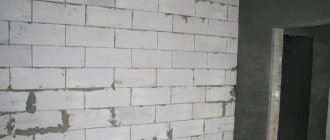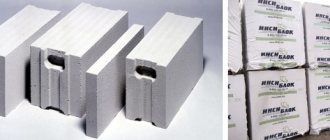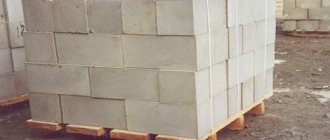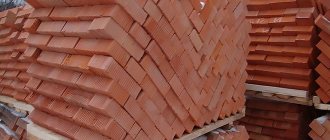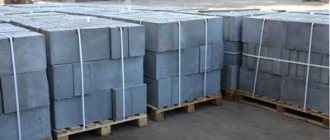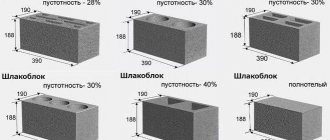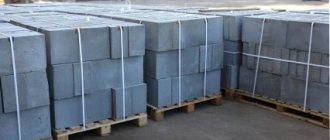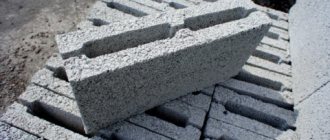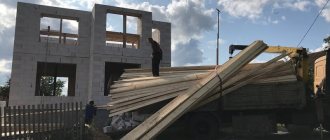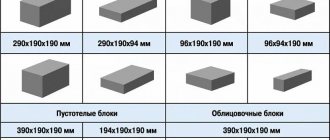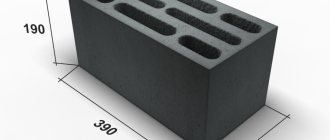Why know the quantity
Any building block, including expanded clay concrete, has standard dimensions - length, width, thickness. Depending on how thick the walls we want to get, we can lay it in a certain way.
Let's consider a block measuring 390x190x120 mm. If we are laying a partition with a thickness of 120 mm, then for 1 meter of wall height we will need 5 whole blocks. In this case, the height of the block will be 190 mm. This is a partition block, but we can use it to build internal walls, 190 mm thick. Then the height of the block will be 120 mm and 8 blocks will be required per 1 meter of height. Therefore, it is important to know how many blocks are needed to build walls or partitions and how many pieces are in a cube.
This question may arise when calculating for work during the construction of walls. It is more convenient to calculate the volume by the number of laid blocks, and the estimated price is usually taken per m3 of masonry.
It is important to know how many blocks can be placed on a pallet when loading or unloading. How many expanded clay blocks per cube you need to know to compare prices for this material. Some manufacturers set prices per piece, others - per 1 m3.
Calculation of the number of expanded clay concrete blocks in 1 m3
When purchasing building blocks, payment can be made per volume in m3. When calculating the needs for construction, their number in pieces often appears. For this and some other purposes, you need to know how many expanded clay concrete blocks are in 1 m3.
Why know the quantity
Any building block, including expanded clay concrete, has standard dimensions - length, width, thickness. Depending on how thick the walls we want to get, we can lay it in a certain way.
Let's consider a block measuring 390x190x120 mm. If we are laying a partition with a thickness of 120 mm, then for 1 meter of wall height we will need 5 whole blocks. In this case, the height of the block will be 190 mm. This is a partition block, but we can use it to build internal walls, 190 mm thick. Then the height of the block will be 120 mm and 8 blocks will be required per 1 meter of height. Therefore, it is important to know how many blocks are needed to build walls or partitions and how many pieces are in a cube.
This question may arise when calculating for work during the construction of walls. It is more convenient to calculate the volume by the number of laid blocks, and the estimated price is usually taken per m3 of masonry.
It is important to know how many blocks can be placed on a pallet when loading or unloading. How many expanded clay blocks per cube you need to know to compare prices for this material. Some manufacturers set prices per piece, others - per 1 m3.
Quantity calculation
Let's calculate the number of expanded clay concrete blocks in a cube for various options.
How many blocks in 1 m3
Let's consider how many ordinary blocks of expanded clay concrete are in a cube. Its size is 390x190x190 mm. If we convert the dimensions into meters, we get the following - 0.39x0.19x0.19m. Let's calculate the volume of the block, it is equal to 0.014079 m3. We determine the quantity 1/0.014079 = 72 pieces.
Let us present the calculation when using partition blocks. Their geometric size is 390x190x120 mm. Accordingly, for m3 we get 1/(0.39x0.19x0.12)=112.5 pieces.
We perform calculations in a similar way for blocks of other sizes.
For convenience, we summarize the calculation data in a table.
| Block size | 390x190x190 mm | 390x190x120 mm | 390x190x90 mm |
| Expanded clay concrete block | 72 | 112,5 | 150 |
Number of blocks per pallet
It is important to determine how many expanded clay concrete blocks measuring 20x20x40 can be placed in a pallet. It is believed that this should be no more than 1 m3. This takes into account the area and permissible load on the platform. By placing row blocks measuring 390x190x190 mm on a pallet, taking into account that they have voids and their weight does not exceed the permissible value, you can place 72 pieces.
If you need to load wall blocks made of expanded clay concrete 390x190x90, which do not have voids, then you should not stack the resulting 150 pieces by volume; 120 will be enough so as not to overload the pallet.
How many blocks are consumed per cube when laying walls?
When constructing walls and partitions from blocks, seams filled with cement mortar are formed. Based on this, the dimensions of an ordinary block in a masonry are 40x20x20 cm. According to this calculation, we get 62.5 blocks - 1,000,000/(40x20x20).
Let us present the calculation when using partition blocks. The masonry size will be 400x200x120 mm. By calculation we determine the number of blocks when laying, taking into account the seams - 1/(0.4x0.2x0.12) = 104.5 pieces.
Table for determining the number of blocks per m3 of wall.
| Block size | 400x200x200 mm | 400x200x120 mm | 400x200x90 mm |
| Expanded clay concrete block in masonry | 62,5 | 104,5 | 139 |
The number of blocks in a masonry is a more relevant value, because it is impossible to create a wall without a seam, and this value will be more accurate. Taking into account the thickness of the masonry joint in the calculation, you can get significant savings when building a house.
When calculating the number of blocks in the wall, you should take into account the door and window openings to be installed. For example, let's take a standard house 10x12 m. The entrance doors are made 2 m high and 1.4 m wide. We place 6 windows of 1.43 x 1.1 m along the facade. We take the thickness of the external walls to be 0.4 m. Let's calculate the volume of openings that should be excluded.
Doorway - 2x1.4x0.4 = 1.12 m3.
Window openings – 1.43x1.1x0.4x6 = 3.78 m3. Let's sum up the volumes: 1.12+3.78 = 4.9 m3. Considering how many expanded clay concrete blocks 20x20x40 are in 1 m3, according to preliminary calculations 72 pieces, we get 4.9x72 = 352 blocks.
We similarly calculate blocks for internal walls. We place three doors 2x1 m. The thickness of the partitions is 120 mm. 2x1x0.12x3 = 0.72 m3. There are 112.5 of them in a cube of partition blocks. 0.72x112.5 = 81 pieces.
From the total number of row and partition blocks, we subtract the resulting figures accordingly. The values will correspond to the block requirements for the given object. The dimensions of masonry joints for such a building volume can be ignored. There may always be a need for additional material in case of marriage or battle.
Since building blocks have standard sizes approved by GOST, the above calculations can be used to determine the number of not only expanded clay concrete blocks. Knowing their length, width and height, when multiplied, you can get the volume of a unit of material. Dividing the unit by the volume of one piece obtained in m3, we get the number of blocks in a cube.
Source: https://betonov.com/vidy-betona/keramzitobeton/skolko-keramzitobetonnyh-blokov-v-1-m3.html
Quantity calculation
Let's calculate the number of expanded clay concrete blocks in a cube for various options.
How many blocks in 1 m3
Let's consider how many ordinary blocks of expanded clay concrete are in a cube. Its size is 390x190x190 mm. If we convert the dimensions into meters, we get the following - 0.39x0.19x0.19m. Let's calculate the volume of the block, it is equal to 0.014079 m3. We determine the quantity 1/0.014079 = 72 pieces.
Let us present the calculation when using partition blocks. Their geometric size is 390x190x120 mm. Accordingly, for m3 we get 1/(0.39x0.19x0.12)=112.5 pieces.
We perform calculations in a similar way for blocks of other sizes.
For convenience, we summarize the calculation data in a table.
| Block size | 390x190x190 mm | 390x190x120 mm | 390x190x90 mm |
| Expanded clay concrete block | 72 | 112,5 | 150 |
Number of blocks per pallet
It is important to determine how many expanded clay concrete blocks measuring 20x20x40 can be placed in a pallet. It is believed that this should be no more than 1 m3. This takes into account the area and permissible load on the platform. By placing row blocks measuring 390x190x190 mm on a pallet, taking into account that they have voids and their weight does not exceed the permissible value, you can place 72 pieces.
If you need to load wall blocks made of expanded clay concrete 390x190x90, which do not have voids, then you should not stack the resulting 150 pieces by volume; 120 will be enough so as not to overload the pallet.
How many blocks are consumed per cube when laying walls?
When constructing walls and partitions from blocks, seams filled with cement mortar are formed. Based on this, the dimensions of an ordinary block in a masonry are 40x20x20 cm. According to this calculation, we get 62.5 blocks - 1,000,000/(40x20x20).
Let us present the calculation when using partition blocks. The masonry size will be 400x200x120 mm. By calculation we determine the number of blocks when laying, taking into account the seams - 1/(0.4x0.2x0.12) = 104.5 pieces.
Table for determining the number of blocks per m3 of wall.
| Block size | 400x200x200 mm | 400x200x120 mm | 400x200x90 mm |
| Expanded clay concrete block in masonry | 62,5 | 104,5 | 139 |
The number of blocks in a masonry is a more relevant value, because it is impossible to create a wall without a seam, and this value will be more accurate. Taking into account the thickness of the masonry joint in the calculation, you can get significant savings when building a house.
When calculating the number of blocks in the wall, you should take into account the door and window openings to be installed. For example, let's take a standard house 10x12 m. The entrance doors are made 2 m high and 1.4 m wide. We place 6 windows of 1.43 x 1.1 m along the facade. We take the thickness of the external walls to be 0.4 m. Let's calculate the volume of openings that should be excluded.
Doorway - 2x1.4x0.4 = 1.12 m3.
Window openings – 1.43x1.1x0.4x6 = 3.78 m3. Let's sum up the volumes: 1.12+3.78 = 4.9 m3. Considering how many expanded clay concrete blocks 20x20x40 are in 1 m3, according to preliminary calculations 72 pieces, we get 4.9x72 = 352 blocks.
We similarly calculate blocks for internal walls. We place three doors 2x1 m. The thickness of the partitions is 120 mm. 2x1x0.12x3 = 0.72 m3. There are 112.5 of them in a cube of partition blocks. 0.72x112.5 = 81 pieces.
From the total number of row and partition blocks, we subtract the resulting figures accordingly. The values will correspond to the block requirements for the given object. The dimensions of masonry joints for such a building volume can be ignored. There may always be a need for additional material in case of marriage or battle.
Since building blocks have standard sizes approved by GOST, the above calculations can be used to determine the number of not only expanded clay concrete blocks. Knowing their length, width and height, when multiplied, you can get the volume of a unit of material. Dividing the unit by the volume of one piece obtained in m3, we get the number of blocks in a cube.
What is expanded clay? How many expanded clay blocks in a pallet 390x190x190
Expanded clay is a material that consists of baked clay granules. The production process of one batch takes no more than an hour, and as a result it is possible to obtain a porous material with high thermal insulation properties. Expanded clay is sorted into fractions and packed into bags. Depending on the need, it can also be purchased in bulk.
Advantages of expanded clay
Due to its properties, the material has become especially popular in the construction of private houses and country cottages. Its main advantages include:
- resistance to moisture, rotting and all weather conditions. Expanded clay does not lose its important qualities over time, which allows it to be used for insulating floors, attics and roofs;
- environmental Safety. Only natural raw materials are used in the production of the material. Due to the lack of chemical treatment, expanded clay does not emit harmful substances and is considered an ideal insulation material for residential premises;
- excellent thermal insulation. This property, as well as good air conductivity, prevents the formation of condensation and helps create a healthy atmosphere in the house;
- low cost. Expanded clay is much cheaper than other insulation materials on the market.
Application area
It is most widely used in laying roads and in construction, as a reliable insulation for foundations, interfloor ceilings, and also for sound insulation.
The peculiarity of expanded clay not to absorb moisture is actively used in summer cottages, in landscape design, as well as by lovers of indoor plants. The drainage layer created with its help provides favorable conditions for the growth and development of the root system.
keramzitt.ru
Answers to popular questions about wall blocks
A wall width of 30 cm is not very common, but sometimes they build it this way. With this type of masonry, special attention should be paid to the insulation; the thickness of a wall made of expanded clay concrete blocks of 30 cm may not be enough to ensure effective thermal insulation.
The number of expanded clay blocks on a pallet depends, firstly, on the pallet itself; secondly, on the weight of the product. We assemble pallets of 84 blocks (EUR-pallet) and 105 blocks (FIN-pallet).
If it is necessary to split the block exactly in the middle, then simply break it at the level of the middle jumper. Otherwise, we can advise you to use an angle grinder.
The size of the expanded clay concrete block (hollow or solid) is 390×190×188 mm. Taking into account the mortar joint, there will be 62.5 blocks in one cubic meter.
But taking into account the mortar joint of expanded clay concrete blocks in one square meter there will be exactly 12.5 (with a wall thickness of 20 cm). Or 25 with a wall thickness of 40 cm.
A heavy-duty truck with a lifting capacity of 20 tons can accommodate from 15 to 18 pallets.
The use of expanded clay blocks for construction gives you a huge selection of materials for the exterior decoration of the building: facing brick, blockhouse, siding, plaster, etc.
The products of the Cheboksary Construction Plant have a certificate of conformity and a fire certificate, and there are test reports.
The plaster has excellent adhesion to expanded clay blocks. The technical process of plastering expanded clay blocks is no different from plastering brick walls.
Unlike gas blocks or foam blocks, which are afraid of water, expanded clay concrete blocks are a weather-resistant material that does not require additional protection.
If the clay itself is not radioactive, then expanded clay will be completely safe.
Cinder blocks are wall blocks in the form of slag obtained from blast furnace waste.
The frost resistance grade is a characteristic that determines the reliability and durability of the block.
Blocks with through voids are used to insulate pipes and ventilation systems.
Expanded clay blocks are a wall building material that is made by vibrocompressing the finished mixture.
We do not have. Others may use special additives to speed up the hardening of concrete. We have steaming.
I want to build a cellar from expanded clay concrete blocks 390x190x188. How many are needed for the following sizes?
If you decide to build in half a block, then be sure to insulate the building from the outside. We recommend progressive insulation.
It is generally accepted that a cube of expanded clay blocks will require 0.2 cubic meters of solution. However, this is an average figure.
The masonry mesh must be laid every 3-4 rows.
The slabs should be mounted on a pre-prepared monolithic belt, which will evenly distribute the load on the wall.
It is possible to build a three-story house from expanded clay blocks. Please note that the wall thickness must be at least 400 mm.
Unlike their functional competitors (foam concrete and gas silicate), expanded clay concrete blocks boast the lowest water absorption coefficient.
A 400mm thick wall has a fire resistance of approximately 4 hours.
The geometry of the voids does not have a decisive effect on the characteristics of the blocks. What is more important is their percentage.
For masonry, you can use either special glue or mortar. Before laying on the solution, it is advisable to wet the blocks.
When choosing from expanded clay concrete and thermally efficient blocks, first of all you need to take into account the conditions and means at your disposal.
2988 is the correct number of blocks required for the house and attic with a block wall thickness of 190 + 190 = 380 mm.
skb21.ru
Solid expanded clay concrete blocks M100 390 x 190 x 188 mm
If you find solid expanded clay concrete blocks M100 390 x 190 x 188 mm Kalita cheaper, then we will try to sell you this product at a discount, if it is in our power. All sellers have the same assortment, and not everyone has a caring attitude towards their customers.
Main characteristics
Kalita plant
Size, mm 390×190×188
Strength grade M-100
Purpose Building blocks
Compressive strength B-3.5-7.5
Technological characteristics
Weight, kg 16-18 kg
Frost resistance, F/cycles F-100
Volume of blocks in 1 m2 13
Volume of blocks in 1 m3 72
Density, kg/m3 1150-1300 kg/m5
Boot standard
Quantity on pallet, pcs 75
Additionally
Country of origin Russia
Types of expanded clay concrete blocks
The main classification of expanded clay concrete products is made according to their intended purpose, and includes the following types:
- Structural - used for the construction of load-bearing structures, basement and semi-basement floors, and can be used in the construction of bridges and overpasses. These are solid blocks with a large content of high grade concrete M300-M400 and expanded clay of fine fractions.
- Thermal insulation - used as insulation as an outer layer for load-bearing walls and in frame construction. They can only support their own weight and have a loose, fragile structure with large voids. However, they have the highest thermal resistance coefficient.
- Structural and thermal insulation is an attempt to achieve a compromise between strength and thermal conductivity. Such a wall block can be used in the construction of load-bearing walls in low-rise construction. It also has voids in the body, but they are much smaller and separated by partitions.
Based on their use in building structures, the following types are distinguished:
- Partition walls – used for the construction of non-load-bearing partitions inside a building. Their thickness is only 90 mm. The main standard sizes are 590 (390, 190) x 90 x 188 mm. At the same time, the product weighs 7 or 14 kg, depending on the presence of voids.
- The wall block has dimensions of 390x199x199 mm, 288x288x138 mm, 190x190x138 mm, 190x90x188, 288x138x138. The weight of a solid product reaches 26 kg, and that of a hollow product reaches 17 kg.
All sizes and weights of products of both types are regulated by GOST 6133 99.
IMPORTANT! Many manufacturers, when selling expanded clay concrete blocks, indicate the dimensions of their products as 400x200x200 mm, this is due to the large tolerances allowed by GOST 6133 99, for length and height up to 4 mm, for width up to 3 mm, for straightness of ribs and plane of edges up to 6 mm.
Expanded clay concrete blocks: weight, thermal conductivity, GOST, size + how many pieces in a pallet, cube
Expanded clay concrete blocks are a universal building material, but in order for their use to be most effective, various types of products are produced, the technical and operational characteristics of which differ significantly. Regulates all the features of standard sizes, production technology and composition of the mixture from which expanded clay concrete blocks are made, GOST 6133 99 “Concrete wall stones”.
Types of expanded clay concrete blocks
The classification of expanded clay concrete products is made according to their intended purpose, and includes the following types:
- Structural - used for the construction of load-bearing structures, basement and semi-basement floors, and can be used in the construction of bridges and overpasses. These are solid blocks with a large content of high grade concrete M300-M400 and expanded clay of fine fractions.
- Thermal insulation - used as insulation as an outer layer for load-bearing walls and in frame construction. They can only support their own weight and have a loose, fragile structure with large voids. However, they have the highest thermal resistance coefficient.
- Structural and thermal insulation is an attempt to achieve a compromise between strength and thermal conductivity. Such a wall block can be used in the construction of load-bearing walls in low-rise construction. It also has voids in the body, but they are much smaller and separated by partitions.
Based on their use in building structures, the following types are distinguished:
- Partition walls – used for the construction of non-load-bearing partitions inside a building. Their thickness is only 90 mm. The main standard sizes are 590 (390, 190) x 90 x 188 mm. At the same time, the product weighs 7 or 14 kg, depending on the presence of voids.
- The wall block has dimensions of 390x199x199 mm, 288x288x138 mm, 190x190x138 mm, 190x90x188, 288x138x138. The weight of a solid product reaches 26 kg, and that of a hollow product reaches 17 kg.
All sizes and weights of products of both types are regulated by GOST 6133 99.
IMPORTANT! Many manufacturers, when selling expanded clay concrete blocks, indicate the dimensions of their products as 400x200x200 mm, this is due to the large tolerances allowed by GOST 6133 99, for length and height up to 4 mm, for width up to 3 mm, for straightness of ribs and plane of edges up to 6 mm.
Technical and operational characteristics
The characteristics of expanded clay concrete blocks may vary significantly depending on the size, purpose and additional modifying additives, but all of them are regulated by GOST 6133 99.
Block Strength
The minimum values for thermal insulation blocks are 5-25 kg/cm2.
The maximum for structural ones is 100-500 kg/cm2.
Structural insulating wall – 25 – 100 kg/cm2.
Thermal conductivity
The coefficient ranges from 0.14-0.66 W/m*K. Moreover, it depends not only on the amount of cement in the product (the denser the block, the lower the thermal conductivity), but also on the fraction of the filler - expanded clay, expanded clay or quartz sand. The finer the expanded clay fraction, the greater the density and weight of the block, the greater its thermal conductivity.
4 fractions of expanded clay used for the production of expanded clay concrete
Moisture absorption
Makes up 5-10% by weight of the product. The indicator can be significantly reduced by adding special hydrophobic plasticizers (liquid glass) to the solution.
Frost resistance
It directly depends on how much moisture the material can absorb. The less porosity of the material and the less it absorbs moisture, the more freezing cycles it can withstand. For structural concrete this indicator reaches 500 cycles, structural and thermal insulation up to 150 cycles, thermal insulation 15-50 cycles.
Therefore, if a wall insulating block is used in construction for wall cladding, it can be left unplastered for 2 years, no more.
Soundproofing
The use of slotted (hollow) blocks 390x190x190 mm as load-bearing partitions ensures sound insulation of the room up to 50-75 dB.
Vapor permeability
Depending on the density of the block, vapor permeability can be up to 9 mg/m*h*Pa for partition slotted ones and only 3 mg/m*h*Pa for structural solid ones.
Expanded clay concrete gives the same shrinkage as structures made of heavy concrete - up to 0.3-0.5 mm/m.
Standard sizes
Solid expanded clay concrete block 390x190x190 mm
The number of blocks required for laying 1 m3 is 62.5 pieces, taking into account the mortar joint; for laying 1 m2 of wall, 12.5 blocks will be needed, taking into account the mortar joint. Quantity on the pallet – 60 pieces.
Hollow masonry-insulating 390x190x190 mm. The number of blocks in a cube and the number of blocks required for laying 1 m2 of wall is the same as for a solid one. The pallet holds 72 blocks.
Solid wall dimensions 390x90x190 mm. The quantity in one cube, taking into account the mortar joint, is 125 blocks, 120 pieces fit on a pallet.
The hollow wall block has the same external parameters; there are 125 products in a cube, and 144 products are placed on a pallet.
There are different shapes and volumes of voids inside the block. The weight and strength of the product depends on these parameters.
- Emptiness 30% of the total volume, weighs 18.8 kg dry.
- Emptiness 40% of the total volume, weighs 16.2 kg dry.
Some non-standard types of expanded clay concrete blocks
Given the high competition in the building materials market, many manufacturers are developing their own high-tech products based on expanded clay concrete.
Heat block
A multilayer structure consisting of an expanded clay concrete block with standard dimensions of 390x190x190 mm with one profiled surface, and an outer layer of concrete with a finishing coating.
Thermal block is gaining popularity among private developers
Such multilayer building structures are high-tech elements produced in a factory in compliance with all tolerances. Their thermal conductivity coefficient is much lower, but the main advantage is the speed of laying and the absence of the need for facade finishing work.
Enlarged block with profiled ends
Elements of enlarged formats have dimensions up to 40 cm in width and up to 59 cm in length and can be used to lay a wall in one block. Due to the many voids, their weight is up to 290 kg/m2 of wall, which does not exert significant pressure on the foundation. In addition, profiled ends allow the installation of elements without end mortar binding. Used in low-rise construction.
Large-format slotted blocks for load-bearing walls
The size can reach 370x400x240 mm; their density is much higher than that of hollow elements and reaches 600-700 kg/m3. They can be used in high-rise construction for the construction of enclosing structures of frame houses.
Color blocks
They have the same strength characteristics as regular ones. But in their production, pigments and water repellents added to the solution were used. This will allow you to limit the work on finishing the facade only by opening the seams.
Source: https://all-for-remont.ru/stroimaterialy/xarakteristiki-keramzitobetonnyx-blokov
Technical and operational characteristics
The characteristics of expanded clay concrete blocks may vary significantly depending on the size, purpose and additional modifying additives, but all of them are regulated by GOST 6133 99.
Block Strength
The minimum values for heat-insulating blocks are 5-25 kg/cm2.
The maximum for structural ones is 100-500 kg/cm2.
Structural insulating wall – 25 – 100 kg/cm 2.
Thermal conductivity
The coefficient ranges from 0.14-0.66 W/m*K. Moreover, it depends not only on the amount of cement in the product (the denser the block, the lower the thermal conductivity), but also on the fraction of the filler - expanded clay, expanded clay or quartz sand. The finer the expanded clay fraction, the greater the density and weight of the block, the greater its thermal conductivity.
Moisture absorption
Makes up 5-10% by weight of the product. The indicator can be significantly reduced by adding special hydrophobic plasticizers (liquid glass) to the solution.
Standard sizes
The number of blocks required for laying 1 m 3 is 62.5 pieces, taking into account the mortar joint; for laying 1 m 2 of the wall, 12.5 blocks will be needed, taking into account the mortar joint. Quantity on the pallet – 60 pieces.
Hollow masonry-insulating 390x190x190 mm. The number of blocks in a cube and the number required for laying 1m2 of wall is the same as for a solid one. The pallet holds 72 blocks.
Solid wall dimensions 390x90x190 mm. The quantity in one cube, taking into account the mortar joint, is 125 blocks, 120 pieces fit on a pallet.
The hollow wall block has the same external parameters; there are 125 products in a cube, and 144 products are placed on a pallet.
There are different shapes and volumes of voids inside the block. The weight and strength of the product depends on these parameters.
- Emptiness 30% of the total volume, weighs 18.8 kg dry.
- Emptiness 40% of the total volume, weighs 16.2 kg dry.
Some non-standard types of expanded clay concrete blocks
Given the high competition in the building materials market, many manufacturers are developing their own high-tech products based on expanded clay concrete.
Heat block
A multilayer structure consisting of an expanded clay concrete block with standard dimensions of 390x190x190 mm with one profiled surface, and an outer layer of concrete with a finishing coating.
Such multilayer building structures are high-tech elements produced in a factory in compliance with all tolerances. Their thermal conductivity coefficient is much lower, but the main advantage is the speed of laying and the absence of the need for facade finishing work.
Enlarged block with profiled ends
Elements of enlarged formats have dimensions up to 40 cm in width and up to 59 cm in length and can be used to lay a wall in one block. Due to the many voids, their weight is up to 290 kg/m2 of wall, which does not exert significant pressure on the foundation. In addition, profiled ends allow the installation of elements without end mortar binding. Used in low-rise construction.
Large-format slotted blocks for load-bearing walls
The size can reach 370x400x240 mm; their density is much higher than that of hollow elements and reaches 600-700 kg/m 3. They can be used in high-rise construction for the construction of enclosing structures of frame houses.
Color blocks
They have the same strength characteristics as regular ones. But in their production, pigments and water repellents added to the solution were used. This will allow you to limit the work on finishing the facade only by opening the seams.
Expanded clay concrete blocks from
We are manufacturers. All products are in stock. Production of large volumes in a short time.
Correct geometry and frost resistance. German equipment, automation, materials used, compliance with GOST.
Delivery on the day of order. Own fleet of vehicles with a carrying capacity from 5 to 18 tons. We provide loading and unloading operations. Moscow and Moscow region.
Pickup, sale of small quantities. If necessary, we will dismantle the standard pallet.
Cash and non-cash payments. We work with individuals and legal entities.
Do you have any questions?
Ask our specialists, they are always ready to help you.
8
+7
Main characteristics of expanded clay concrete blocks
Expanded clay concrete block is a building stone made of lightweight concrete, intended for the construction of walls and fences, as well as for the construction of bathhouses, chimneys, garages, and warehouses. The use of this material provides such advantages as no shrinkage, low load on the foundation, and fast construction time.
Expanded clay concrete blocks these characteristics thanks to the use of the vibrocompression method in their production: the finished mixture is immersed in a mold and subjected to vibration, due to which excess air comes out of the solution, while at the same time pressure is applied from above using a punch.
The strength index (M) shows how much weight each cm² of the surface of an element can withstand: the higher the M coefficient, the more weight it can withstand. For private construction, size M75-100 is suitable. For the construction of multi-storey buildings and massive industrial buildings from expanded clay concrete blocks, the coefficient M100 and higher is suitable.
Full automation of the production process and the use of inexpensive natural raw materials can reduce the cost of the finished product.
- Moisture resistance, frost resistance, low thermal conductivity.
Expanded clay concrete practically does not absorb moisture.
The frost resistance index determines the stone’s ability to withstand sudden temperature changes. The coefficient is marked with the letter F. The higher the F value, the better the concrete’s resistance to high temperatures. manufactures products with the highest frost resistance coefficient - F-50, which is ideal for Russian climatic conditions.
Low thermal conductivity is ensured by the porous material included in the block - expanded clay, the granules of which are durable and light.
- High level of thermal insulation and sound insulation.
Expanded clay concrete, due to its properties, allows you to retain up to 75% of heat, as a result of which, in most cases, wall insulation with expensive materials is not required.
In terms of their soundproofing characteristics, expanded clay concrete blocks are significantly superior to most other building materials used in the construction of buildings and structures.
Quality product from a reliable manufacturer
If you want to buy high quality expanded clay concrete blocks , you should contact the manufacturer directly. Firstly, this will help you avoid purchasing defective products. And secondly, it will significantly reduce your construction costs.
uses environmentally friendly raw materials to produce products. Our workshops are equipped with the best European technology, which allows us to produce concrete products in large volumes. All our products are tested in the laboratory and comply with GOST quality.
Our own fleet of specialized equipment allows us to deliver throughout Moscow and the Moscow region. We also cooperate with transport companies, so we are able to ship our products throughout Russia.
Dimensions and prices of expanded clay concrete blocks
Based on size, building stones are divided into wall and partition stones.
By type, blocks are divided into hollow (used in the construction of one-story buildings and partitions) and solid (intended for the construction of multi-story buildings and load-bearing walls).
Useful tips
If you want to buy expanded clay concrete blocks of excellent quality, be sure to ask the manufacturer for a certificate of conformity (there must be separate certificates for hollow and solid blocks).
A visual inspection of the products will also help you avoid purchasing defective products. In doing so, pay attention to the following details:
- no chips on the corners;
- rough surface;
- the same shape of each element (this will help avoid settlement and swelling);
- the color of a quality block is always gray (the product should not contain inclusions of other colors; black, yellow, white);
- the weight of all elements must be the same.
When purchasing expanded clay concrete blocks from us, you can be confident in the quality of the products!
Types of expanded clay concrete blocks
The main classification of expanded clay concrete products is made according to their intended purpose, and includes the following types:
- Structural - used for the construction of load-bearing structures, basement and semi-basement floors, and can be used in the construction of bridges and overpasses. These are solid blocks with a large content of high grade concrete M300-M400 and expanded clay of fine fractions.
- Thermal insulation - used as insulation as an outer layer for load-bearing walls and in frame construction. They can only support their own weight and have a loose, fragile structure with large voids. However, they have the highest thermal resistance coefficient.
- Structural and thermal insulation is an attempt to achieve a compromise between strength and thermal conductivity. Such a wall block can be used in the construction of load-bearing walls in low-rise construction. It also has voids in the body, but they are much smaller and separated by partitions.
Based on their use in building structures, the following types are distinguished:
- Partition walls – used for the construction of non-load-bearing partitions inside a building. Their thickness is only 90 mm. The main standard sizes are 590 (390, 190) x 90 x 188 mm. At the same time, the product weighs 7 or 14 kg, depending on the presence of voids.
- The wall block has dimensions of 390x199x199 mm, 288x288x138 mm, 190x190x138 mm, 190x90x188, 288x138x138. The weight of a solid product reaches 26 kg, and that of a hollow product reaches 17 kg.
All sizes and weights of products of both types are regulated by GOST 6133 99.
IMPORTANT! Many manufacturers, when selling expanded clay concrete blocks, indicate the dimensions of their products as 400x200x200 mm, this is due to the large tolerances allowed by GOST 6133 99, for length and height up to 4 mm, for width up to 3 mm, for straightness of ribs and plane of edges up to 6 mm.
How many expanded clay concrete blocks are in a pallet?
Information on the number of expanded clay concrete blocks in a pallet is necessary when calculating materials in the case of erecting the walls of a country house or outbuildings. It should be noted that the exact value of expanded clay concrete products per pallet will depend on the size of the materials and the capacity of the container. In this case, you need to rely on standardized dimensions of blocks and standard-sized pallets with a certain maximum load value.
Depending on the area of use, the following types of expanded clay concrete blocks are distinguished:
- products for the construction of internal walls (partitions). The thickness of such materials is standard -9 centimeters, the height is also constant -18.8 centimeters, but the length can vary, its value is 19.39 or 59 centimeters. The weight of an individual block depends on the overall dimensions and volume of voids; it can vary from 7 to 14 kilograms;
- The second type of blocks is wall. Such products are intended for laying load-bearing walls of a building; they can have a solid structure or contain voids, depending on this the weight also changes: solid expanded clay concrete blocks weigh 26 kilograms, hollow ones – 17 kilograms. The main dimensions of the materials under consideration are as follows: 19.9 × 19.9 × 39 centimeters; 19x19x13.8 centimeters; 28.8×13.8×13.8 centimeters, and also 28.8×28.8×13.8 centimeters.
All specified dimensions of expanded clay concrete blocks are regulated by state standards, however, in practice, the dimensions of products can be reduced to an integer value, for example, 40 × 20 × 20 centimeters. This is due to a significant error: no more than 6 millimeters in length, no more than 4 millimeters in height, no more than 3 millimeters in width.
Experienced builders say that blocks with dimensions of 39×19×19 centimeters are used most often in construction, so let’s figure out how many such expanded clay concrete blocks are in a pallet and a cubic meter. Using simple mathematical calculations, you can find out that 62.5 similar products will fit in one cube.
If we talk about the amount of materials in a pallet, then a cube of expanded clay concrete can be loaded onto such a container, but the products must be laid so that the result is a whole number. Taking into account the area of the pallet and permissible loads, 60 similar products can be placed on such a platform; when using materials with voids - 72 pieces/pallet.
Now let's talk about wall expanded clay concrete blocks. For example, let’s take the size of the products 39×9×19 centimeters, there will be 125 pieces in a cube, and 120 pieces can be loaded into a pallet.
Technical and operational characteristics
The characteristics of expanded clay concrete blocks may vary significantly depending on the size, purpose and additional modifying additives, but all of them are regulated by GOST 6133 99.
Block Strength
The minimum values for heat-insulating blocks are 5-25 kg/cm2.
The maximum for structural ones is 100-500 kg/cm2.
Structural insulating wall – 25 – 100 kg/cm 2.
Thermal conductivity
The coefficient ranges from 0.14-0.66 W/m*K. Moreover, it depends not only on the amount of cement in the product (the denser the block, the lower the thermal conductivity), but also on the fraction of the filler - expanded clay, expanded clay or quartz sand. The finer the expanded clay fraction, the greater the density and weight of the block, the greater its thermal conductivity.
Moisture absorption
Makes up 5-10% by weight of the product. The indicator can be significantly reduced by adding special hydrophobic plasticizers (liquid glass) to the solution.
Frost resistance
It directly depends on how much moisture the material can absorb. The less porosity of the material and the less it absorbs moisture, the more freezing cycles it can withstand. For structural concrete this indicator reaches 500 cycles, structural and thermal insulation up to 150 cycles, thermal insulation 15-50 cycles.
Therefore, if a wall insulating block is used in construction for wall cladding, it can be left unplastered for 2 years, no more.
Soundproofing
The use of slotted (hollow) blocks 390x190x190 mm as load-bearing partitions ensures sound insulation of the room up to 50-75 dB.
Vapor permeability
Depending on the density of the block, vapor permeability can be up to 9 mg/m*h*Pa for partition slotted ones and only 3 mg/m*h*Pa for structural solid ones.
Expanded clay concrete gives the same shrinkage as structures made of heavy concrete - up to 0.3-0.5 mm/m.
Expanded clay block - new from Europe
“Blok-Expert” continues to introduce you in detail to various types of building blocks. This time we will talk about a block of expanded clay concrete, or expanded clay block.
This material is not as advertised as foam or gas block, and yet it is in no way inferior to them in characteristics and positive qualities.
Expanded clay block: material features
A block of expanded clay concrete is a universal building block made from Portland cement and expanded clay, a popular bulk insulation material. Expanded clay is small, light balls of fired clay with a porous structure.
When it is added to the cement-sand mixture, a new material is obtained that is warm and light - expanded clay concrete. It is usually produced in the form of large format building blocks.
Expanded clay blocks are produced by volumetric vibrocompression and can have a wide variety of technical properties (depending on their purpose). Blocks can be produced in solid or hollow versions, with or without cladding, tongue-and-groove system.
Expanded clay concrete is also popular for the production of so-called heat blocks - wall blocks with a multilayer structure (the first layer is an expanded clay concrete base, the second layer is insulation, most often polystyrene foam, the third layer is decorative cladding).
Expanded clay block has become especially widespread in Europe and is used everywhere there due to its environmental friendliness and practicality. The European name for this material is ecoblock or bioblock (indeed, expanded clay block contains no harmful artificial substances).
In Russia, this block has not yet gained wide popularity, but is already trusted by an increasing number of builders.
Expanded clay block - profitable construction!
The combination of cement and expanded clay creates a warm, light and durable material for construction. Expanded clay block is:
- Warm walls of minimal thickness (less than half a meter!)
- Reducing the cost of transportation, masonry, finishing work by 20-30% compared to brick
- Absolute safety for health and the environment (the block consists only of Portland cement, clay, water and sand)
- The most comfortable microclimate in the house (the unit “breathes”)
- A reliable and durable house (the service life of the unit is over 50 years!)
That is why more and more buyers are choosing expanded clay blocks for the construction of their cottage.
Specifications
The properties of the expanded clay concrete block comply with the standards of GOST 6133-99 “Concrete wall stones”.
NameValue
| Weight 1pc | 20 kg |
| Dimensions | Standard size – 400×200×200 mm (actually – 390×190×188 mm) |
| Strength | Compressive strength grades from M25 to M300 |
| Density | 300-600 kg/m3 (D300-D600) |
| Coefficient of thermal conductivity | 0.2 W/m*K |
| Specific heat | 0.84 kJ/(kg*°С) |
| Vapor permeability coefficient | 0.08-0.3 mg/m h Pa |
| Water absorption | 5-10% |
| Number of frost resistance cycles | 15-200 (F15, F25, F35, F50, F100, F150, F200) |
| Operating temperature | -60 – 70 °C |
| Fire resistance | Non-flammable (3-7 hours) |
| Drying shrinkage | 0.3-0.5 mm/m |
| How many pieces per cube/pallet | 62.5/62.5 (block size 400×200×200 mm) |
Application of expanded clay block
Expanded clay blocks can be used for constructing load-bearing walls and partitions, foundations, thermal insulation, as well as for cladding facades and creating various decorative structures.
Wall (construction) expanded clay block is suitable for the construction of load-bearing walls of low-rise residential and non-residential buildings (3-5 floors high). Expanded clay concrete block with high grades of density and strength can also be used for building foundations.
For the foundation, a hollow expanded clay block can be used, which is reinforced with reinforcing bars and filled with heavy concrete.
For the installation of partitions and filling the frames of high-rise buildings of monolithic frame construction, a partition block is used, which is light weight, low density and strength.
Blocks with low density and strength are also used to construct independent thermal insulation layers (for example, in three-layer walls). They are used instead of popular insulation materials such as mineral wool or expanded polystyrene.
To decorate the facades of buildings, a facing expanded clay block can be used, which has a decorative surface (the surface of the block can be colored and/or textured).
Three-layer thermal blocks (or thermally efficient blocks) based on expanded clay concrete help to significantly reduce the cost of construction and speed up installation work. They consist of three layers.
The first layer, the load-bearing layer, is the expanded clay concrete itself. The second layer is insulation (usually polystyrene foam, but it can also be mineral wool, basalt insulation, etc.). The third layer is decorative cladding, which can have different colors or imitate natural surfaces (for example, masonry).
Expanded clay block inexpensively in Yekaterinburg
Where is it profitable to buy expanded clay blocks in Yekaterinburg and the Sverdlovsk region? Of course, in the Block-Expert online store! We sell expanded clay blocks wholesale and retail at wholesale prices.
Standard sizes
The number of blocks required for laying 1 m 3 is 62.5 pieces, taking into account the mortar joint; for laying 1 m 2 of the wall, 12.5 blocks will be needed, taking into account the mortar joint. Quantity on the pallet – 60 pieces.
Hollow masonry-insulating 390x190x190 mm. The number of blocks in a cube and the number required for laying 1m2 of wall is the same as for a solid one. The pallet holds 72 blocks.
Solid wall dimensions 390x90x190 mm. The quantity in one cube, taking into account the mortar joint, is 125 blocks, 120 pieces fit on a pallet.
The hollow wall block has the same external parameters; there are 125 products in a cube, and 144 products are placed on a pallet.
There are different shapes and volumes of voids inside the block. The weight and strength of the product depends on these parameters.
- Emptiness 30% of the total volume, weighs 18.8 kg dry.
- Emptiness 40% of the total volume, weighs 16.2 kg dry.
How much does one pallet of blocks cost?
Gas silicate blocks
| "Minsk KSI" Density D500. Category 1 for glue. delivery is paid separately. | from 117 RUR/m3 | |
| 200-250-625 | in a pallet 2 m3, 64 pcs. | 108 r/m3 |
| 300-250-625 | in a pallet 1.875 m3, 60 pcs. | 108 r/m3 |
| 400-250-625 | in a pallet 2 m3, 32 pcs. | 108 r/m3 |
| 150-250-625 | in a pallet 1.875 m3, 120 pcs. | 108 r/m3 |
Some non-standard types of expanded clay concrete blocks
Given the high competition in the building materials market, many manufacturers are developing their own high-tech products based on expanded clay concrete.
Heat block
A multilayer structure consisting of an expanded clay concrete block with standard dimensions of 390x190x190 mm with one profiled surface, and an outer layer of concrete with a finishing coating.
Such multilayer building structures are high-tech elements produced in a factory in compliance with all tolerances. Their thermal conductivity coefficient is much lower, but the main advantage is the speed of laying and the absence of the need for facade finishing work.
Enlarged block with profiled ends
Elements of enlarged formats have dimensions up to 40 cm in width and up to 59 cm in length and can be used to lay a wall in one block. Due to the many voids, their weight is up to 290 kg/m2 of wall, which does not exert significant pressure on the foundation. In addition, profiled ends allow the installation of elements without end mortar binding. Used in low-rise construction.
Large-format slotted blocks for load-bearing walls
The size can reach 370x400x240 mm; their density is much higher than that of hollow elements and reaches 600-700 kg/m 3. They can be used in high-rise construction for the construction of enclosing structures of frame houses.
